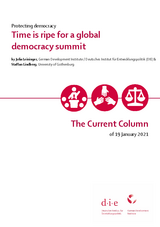The Current Column
Protecting democracy
Time is ripe for a global democracy summit
Leininger, Julia / Staffan I. LindbergThe Current Column (2021)
German Development Institute / Deutsches Institut für Entwicklungspolitik (DIE), The Current Column of 19 January 2021
Assaults on democratic institutions have become the new normal in the 21st century. Even so, for the President and members of Congress to incite a mob to storm the US capitol on 6 January 2021 is unparalleled. Confronted with a world-wide surge in ‘autocratization’ and repeated attacks on democracy, world leaders have rejuvenated the idea of a global coalition of democracies. For instance, new US President Joe Biden announced his intention to convene an international Democracy Summit. Boris Johnson has proposed a D(emocracy)10 bringing together the G7 states with Australia, India and South Korea. German foreign minister Heiko Maas recently suggested a Marshall Plan for Democracy, and Sweden launched the ‘Drive for Democracy’ as a new foreign policy priority.
Protection of democracy is a domestic as well as an international issue. Protecting democracy against autocratization is a matter of both – restoring democracy at home and standing up for democracy abroad. Such global initiatives for democracy can – or rather must – become game changers. We must turn around current autocratization trends and shield democracy. Learning from the past is then essential for making a global initiative for democracy protection successful.
The end of ”the West teaching democracy to the rest“
Standing up for democracy today entails admitting that “the West” does not have all the solutions, and is not free of problems. Earlier initiatives like the Community of Democracies, founded in 2000, focused on external threats to democracy without acknowledging hazards coming from within. Ugly nationalism, economic insecurity, social segregation, disinformation and conspiracy theories, the spread of far-right as well as religious extremist ideologies, and postmodern arguments telling us there is “no truth”, all portend a possible paradigm shift, which will not be in favour of democracy and human rights. Fear is a very powerful and dangerous political force, as we know from the 1930s. Acknowledging that many countries all around the globe face challenges to democracy would help to build an alliance of countries from both the global South and North.
Handle the narrative about democracy with care
We know that there is no “End of History”. Democratic reversals have been rather the norm than the exception in history and the world is now in the third wave of autocratization. Domestic enemies of democracy are as significant as attacks by powerful countries. Yes, countries like China, Russia, Saudi Arabia, and Turkey use democratic deficits and events like 6 January in the US to showcase their stability and security, and they are actively pursuing anti-democratic agendas globally. External and internal threats to democracy must be countered with a narrative of a strong case for democracy. We urgently need to put much more effort into researching and demonstrating the economic and social benefits of democracy and the protection of civil and human rights.
Do not shy away from values and be confident in democracy’s allies
Allies must guard democracy without being defensive. Global initiatives to protect democracy are based on the idea of shared values such as equality, respect for human dignity, and the right to individual self-determination. The philosopher Karl Popper famously laid out the “paradox of tolerance”: A tolerant, democratic society cannot tolerate the intolerant. Reciprocal tolerance of pluralism, respect for universal human rights and equal human worth, is the value foundation that cannot be compromised. Democracy protection requires to draw a red line protecting these values, as well as starting a conversation with elites, institutions and civil societies where these red lines are at risk or have been crossed. Internationally, it will be crucial to boost non-partisan civic education across different social and age groups. Increasing polarization risks the social cohesion of many societies. Standing up for shared values that can (re-)build a solid foundation for cohesive societies is necessary for stronger democracies. The German Federal Agency for Civic Education might be a good role model for that purpose.
Even with an increasing number of autocracies, governments are not on their own in the struggle for democracy as during the Cold War. Civil societies have become powerful actors in both domestic and global politics. Even if autocratic governments oppose democratization, states can ally with non-state actors struggling for more freedom. Surveys conducted across the world show robust majority support for democracy over its alternatives in most places. There is thus no need to be defensive – there are a lot of pro-democratic minds out there.
No Choice
Many are voicing concerns that a global initiative to protect democracy will deepen normative divisions in global politics – but there is no choice at this point. Divisions have been ignited, kindled, and brought into fuming flames by the enemies of democracy at home, and abroad. Germany, and all countries in Europe for that matter, know from historical experience that seeking joint truce with, and offering leniency to the prophets of intolerance, only emboldens them. The EU must now stand up for democracy, at home and abroad.
Professor Staffan I. Lindberg is Director of the V-Dem Institute at University of Gothenburg; Wallenberg Academy Fellow; and Principal Investigator of Varieties of Democracy (V-Dem) and of Failing and Successful Sequences of Democratization (FASDEM, ERC Consolidator).
Dr Julia Leininger is Head the Programme “Transformation of political (dis-)order”. She works on political transformation, democracy promotion and social cohesion.


